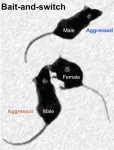(Press-News.org) Distinct immune “signatures” in patients who develop adverse events while taking immunotherapy for cancer may help oncologists identify patients at risk and treat them early to prevent serious side effects, suggests a study by researchers from the Johns Hopkins Kimmel Cancer Center and its Bloomberg~Kimmel Institute for Cancer Immunotherapy.
The study, published Oct. 15 in the Journal of Clinical Investigation, is the largest to date to look at immune signatures in patients with a range of cancers. It included a diverse sample of 111 patients treated with immune checkpoint inhibitors — substances that reactivate the body’s natural anti-cancer immunity. About 40% of patients developed immune-related adverse events, as expected. However, the patients who developed these side effects were more likely to have received a combination of immune checkpoint inhibitors and to have a history of autoimmune disease. Researchers also discovered a distinct immune “signature” in patients who later developed adverse events.
“Increases in white blood cells known as T-cell helper 2 (Th2) and T-cell helper 17 (Th17), and their respective cytokines, predate the development of immune-related adverse events and are potential targets for treating immune-related adverse events,” says Mark Yarchoan, M.D., the study’s senior author and associate professor of oncology at the Johns Hopkins Kimmel Cancer Center. The study’s co-senior author was Won Jin Ho, M.D., director of the Mass Cytometry Facility and associate director of the Convergence Institute at the Johns Hopkins Kimmel Cancer Center.
Immunotherapy has improved outcomes for many patients with cancer. Yet a subset of patients who receive immune checkpoint inhibitors develop devastating adverse effects that can cause lasting disability or even death. For patients with advanced cancer who have exhausted other treatment options, immunotherapy is often worth the risk, Yarchoan says.
“The calculus becomes much more difficult when these drugs are used for patients with curable cancers earlier in the course of disease,” he says. “We increasingly have situations where patients are cured of cancer but have lifelong devastating complications from the treatment.”
Oncologists use drugs designed to treat arthritis or other autoimmune conditions to treat these adverse effects. However, scientists do not know the exact mechanisms causing these adverse events or how to treat them best, Yarchoan notes. Some studies have examined these adverse effects in people with skin cancer; however, they did not include many Black patients, who are less likely to develop skin cancer. Yarchoan and his colleagues wanted to see if they could learn more with a more representative sample of patients from the Johns Hopkins Kimmel Cancer Center.
They found that increases in Th2 and Th17 were an early warning signal for impending adverse events. They also observed that rising levels of the cytokine interleukin 6 (IL-6), an anti-inflammatory protein released by immune cells, was the strongest predictor of which patients would develop an immune-related adverse event. Higher levels of IL-6 were also related to worse cancer therapy outcomes.
“IL-6 appeared to be a two-for-one,” Ho says. “It may play a dual role in cancer progression and promoting immune adverse events. Our data strongly support the use of IL-6 inhibitors to treat immune-adverse events and prevent them.”
Aliyah Pabani, M.D., M.P.H., assistant professor of oncology and co-director of the Immune-Related Toxicity Team at the Johns Hopkins Kimmel Cancer Center, has launched a clinical trial to determine if patients who previously had to discontinue immune checkpoint inhibitors because of immune adverse events can safely restart them if they also take IL-6 inhibitors to prevent such events.
“This is a beautiful example of the Kimmel Cancer Center team’s bench-to-bedside approach,” Pabani says. “We are wasting no time as we work to translate the team’s discoveries into improved therapies to help our patients.”
Yarchoan, Ho and their colleagues will also continue their research by recruiting 500 patients to verify what they’ve learned and to get more detailed information about the immune signatures associated with specific types of immune-related adverse events. For example, they want to know if the cytokines that drive arthritis are the same as those that cause liver inflammation.
The study’s co-authors were Chester Kao, Soren Charmsaz, Stephanie Alden, Madelena Brancati, Howard Li, Aanika Balaji, Kabeer Munjal, Kathryn Howe, Sarah Mitchell, James Leatherman, Ervin Griffin, Mari Nakazawa, Hua-Ling Tsai, Ludmila Danilova, Chris Thoburn, Jennifer Gizzi, Nicole Gross, Alexei Hernandez, Erin Coyne, Sarah Shin, Jayalaxmi Suresh Babu, George Apostol, Jennifer Durham, Brian Christmas, Maximilian Konig, Evan Lipson, Jarushka Naidoo, Laura Cappelli, Aliyah Pabani, Yasser Ged, Marina Baretti, Julie Brahmer, Jean Hoffman-Censits, Tanguy Seiwert, Elizabeth Jaffee, and Won Jin Ho of Johns Hopkins. Researchers from Beaumont Hospital and RCSI University Health Sciences in Dublin, Ireland, F. Hoffman-La Roche Ltd., and Genentech Inc. also contributed.
The study was supported by the Johns Hopkins Bloomberg~Kimmel Institute for Cancer Immunotherapy, the National Cancer Institute, the National Institutes of Health, Swim Across America, the National Institute of Arthritis and Musculoskeletal Diseases, and the immunotherapy Centers of Research Excellence (imCORE) Network-Genentech.
Yarchoan receives grant/research support (to Johns Hopkins) from Bristol-Myers Squibb, Exelixis, Inctyte and Genentech, and receives honoraria from Exelixis, AstraZeneca, Replimune, Hepion Pharmaceuticals, Lantheus, Genentech and Incyte. He is the co-inventor of patents related to therapeutic cancer vaccines, and is a co-founder with equity of Adventris Pharmaceuticals, outside of the work described here. These relationships are managed by The Johns Hopkins University in accordance with its conflict-of-interest policies.
END
Immune signatures may predict adverse events from immunotherapy
2024-10-15
ELSE PRESS RELEASES FROM THIS DATE:
UTA invests in cutting-edge genomic research technology
2024-10-15
The North Texas Genome Center (NTGC) at UT Arlington is getting an upgrade in the form of a next-generation genetic sequencer that will allow researchers to study genetic links between health and disease at a large scale. The new $1 million instrument, the only one of its kind in North Texas, will allow faculty and students to more deeply analyze rare genetic variants, an important step in discovering new insights for the future of health care.
“I’m excited to be able to expand and upgrade the technological capabilities of the North Texas Genome Center, a collaborative ...
Male mice use female mice to distract aggressors and avoid conflict
2024-10-15
A research group led by Joshua Neunuebel at the University of Delaware, USA, tracked the behavior of mice using machine learning to understand how they handle aggressive behavior from other mice. The researchers’ findings, published on October 15th in the open-access journal PLOS Biology, show that male mice deescalate aggressive encounters by running over to a female mouse to distract the aggressive male mouse.
The researchers recorded groups of two male and two female mice interacting over five hours. Like many other animals, mice have social hierarchies, and in almost each group recorded, one male was always significantly more aggressive towards the other.
Social interactions ...
19th century French psychiatrists: Unsung heroes of modern melancholia research
2024-10-15
In an era where mental health awareness is at the forefront of public discourse, a new historical review is shedding light on the often-overlooked French contributions to our understanding of depression. Published in Genomic Psychiatry, the study by Dr. Kenneth S. Kendler and Virginia Justis of Virginia Commonwealth University examines a seminal 1897 French monograph that helped shape modern concepts of melancholia and depression.
The review focuses on "La Mélancolie" by Jacques Roubinovitch ...
Fighting the opioid epidemic: AI and optimization model leads to more accessible, equitable treatment resource distribution
2024-10-15
New Study Key Takeaways:
New model focuses on more equity and accessibility in opioid overdose treatment locations and resource allocation.
Utilizing this model, the results project that within 2 years, there will be a decrease in the number of people with opioid use disorder, an increase in the number of people getting treatment and a decrease in opioid-related deaths.
Policymakers should target adding treatment facilities to counties that have significantly fewer facilities than their population share and are more socially vulnerable.
BALTIMORE, MD, October 15, 2024 – The opioid epidemic is a crisis that has plagued the United States for decades. ...
2 million voters with felony convictions have the right to vote – but might not know
2024-10-15
Key takeaways
Voting eligibility for people with felony convictions has expanded since 1997, with more than two million individuals now able to vote.
Several factors, like misinformation, distrust of government or lack of clarity around procedures, impede many from exercising their right to vote.
Direct outreach, including through trusted, on-the-ground community organizations, as well as informational text messaging, can help eligible voters navigate the process and make sure their voices are included in elections.
As get-out-the-vote efforts hit high gear nationwide, a team of sociologists, political scientists ...
Alzheimer’s disease may damage the brain in two phases
2024-10-15
Alzheimer’s disease may damage the brain in two distinct phases, based on new research funded by the National Institutes of Health (NIH) using sophisticated brain mapping tools. According to researchers who discovered this new view, the first, early phase happens slowly and silently — before people experience memory problems — harming just a few vulnerable cell types. In contrast, the second, late phase causes damage that is more widely destructive and coincides with the appearance of symptoms and the rapid ...
Enhanced wavelength conversion to advance quantum information networks
2024-10-15
Advancements in quantum information technology are paving the way for faster and more efficient data transfer. A key challenge has been ensuring that qubits, the fundamental units of quantum information, can be transferred between different wavelengths without losing their essential properties, such as coherence and entanglement. As reported in Advanced Photonics, researchers from Shanghai Jiao Tong University (SJTU) recently made significant strides in this area by developing a novel method for broadband frequency conversion, a crucial step for future quantum networks.
The SJTU team focused on a technique using X-cut thin film lithium niobate ...
Aston University researchers to explore using AI and fibre-optic networks to monitor natural hazards and infrastructures
2024-10-15
Aston University is leading a new £5.5 million EU research project
Will focus on converting fibre-optic cables into sensors to detect natural hazards
Could identify earthquakes and tsunamis and assess civil infrastructure.
Aston University is leading a new £5.5 million EU research project to explore converting existing telecommunication fibre-optic cables into sensors which can detect natural hazards, such as earthquakes and tsunamis, and assess the condition of civil infrastructure.
The project is called ECSTATIC (Engineering Combined Sensing and Telecommunications Architectures for Tectonic and Infrastructure Characterisation) ...
Testing and evaluation of health care applications of large language models
2024-10-15
About The Study: Existing evaluations of large language models mostly focus on accuracy of question answering for medical examinations, without consideration of real patient care data. Dimensions such as fairness, bias, and toxicity and deployment considerations received limited attention. Future evaluations should adopt standardized applications and metrics, use clinical data, and broaden focus to include a wider range of tasks and specialties.
Corresponding Author: To contact the corresponding author, Nigam H. Shah, MBBS, PhD, email nigam@stanford.edu.
To ...
FDA perspective on the regulation of AI in health care and biomedicine
2024-10-15
About The Study: Strong oversight by the U.S. Food and Drug Administration (FDA) protects the long-term success of industries by focusing on evaluation to advance regulated technologies that improve health. The FDA will continue to play a central role in ensuring safe, effective, and trustworthy AI tools to improve the lives of patients and clinicians alike. However, all involved entities will need to attend to AI with the rigor this transformative technology merits.
Corresponding Author: To contact the corresponding author, Haider J. Warraich, MD, email haider.warraich@fda.hhs.gov.
To ...





